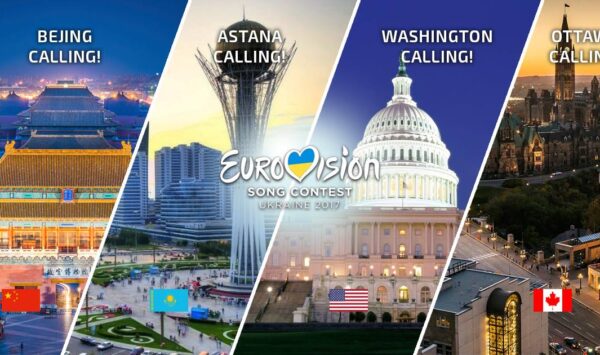Will we be hearing Beijing calling, Astana calling, Ottawa calling and Washington calling! at the Eurovision Song Contest in the near future? Will the Eurovision Song Contest opens its doors to new countries far and away?
There has been much speculation regarding the expansion of the Eurovision Song Contest to countries beyond our continent after Australia was invited to enter the competition in 2015. The Aussies came back in 2016 and nearly walked away with the Grand Prix in Stockholm, and it is more than likely that we will see Australia compete in Kyiv next year.
We must not forget that Australian broadcaster SBS is not an Active Member of the EBU, but an Associate Member.
So what about Kazakhstan, USA, China, and Canada are they eligible to compete? Will they be able to enter the competition in the near future? Will we see any of them debut in Kyiv?
ESCToday decided to look into the matter and investigate further. Let’s have a look at which countries are eligible to compete at the Eurovision Song Contest.
Which countries can participate at the Eurovision Song Contest?
The official website of the Eurovision Song Contest eurovision.tv states the following:
Namely, all Members of the European Broadcasting Union (EBU) can take part in the Eurovision Song Contest. Every year, the invitation to participate in the contest is sent out to all Members. While some of them choose not to take part, most of them do. Associates of the EBU may also be eligible to enter the Eurovision Song Contest, this is decided by the Reference Group, the governing body of the Eurovision Song Contest, on a case by case basis.
Thus the EBU has 73 active members in 56 countries and 35 associates in 21 countries. Hence does this mean we might see Canada, USA, Kazakhstan, China, South Africa etc. in the competition in the foreseeable future if Associate Members also be eligible to enter the competition? Australia is an associate member and has entered the competition twice after an invitation of the EBU approved by the Reference Group.
Who can become a Member of the EBU?
In order to join the EBU as an active member a country must comply with a number of regulations; including being in the European Broadcasting Area. Membership of the EBU is open to broadcasting organisations or groups of such organisations from:
- a member country of the International Telecommunication Union (ITU) situated in the European Broadcasting Area as defined by the Radio Regulations annexed to the International Telecommunication Convention, or a member country of the Council of Europe which is situated outside the European Broadcasting Area
- which provide in that country, with the authorisation of the competent authorities, a broadcasting service of national character and importance, and which furthermore prove that they fulfil all the conditions set out below:
- (a) virtually all of the national radio and/or television households are in a position and technically equipped to receive the entirety of their major radio and/or television programme service with satisfactory technical quality;
- (b) they are under an obligation to, and actually do, provide varied and balanced programming for all sections of the population, including programmes catering for special/minority interests of various sections of the public, irrespective of the ratio of programme cost to audience;
- (c) they actually produce and/or commission at their own cost and under their own editorial control a substantial proportion of the programmes broadcast;
- (d) they are not linked to a sports rights agency which engages in the acquisition of European television rights in competition with the EBU.
In order to become a Member of the European Broadcasting Area and thus compete in the Eurovision Song Contest, one of the prime conditions is to be in the European Broadcasting Area.
Where is the European Broadcasting Area and what is it?
Eurovision.tv states:
The “European Broadcasting Area” is bounded on the West by the western boundary of Region 1, on the east by the meridian 40° East of Greenwich and on the South by the parallel 30° North so as to include the northern part of Saudi Arabia and that part of those countries bordering the Mediterranean within these limits. That is also the reason why for example Israel can take part in the contest.
In addition, Iraq, Jordan and that part of the territory of Syrian Arab Republic, Turkey and Ukraine lying outside the above limits are included in the European Broadcasting Area.
On the map underneath the European Broadcasting Area is portrayed in green.

Regarding the potential participation at the Eurovision Song Contest of Associate Members from outside the European Broadcasting Area eurovision.tv states:
Associates of the EBU, outside of the European Broadcasting Area, may also be eligible to enter the Eurovision Song Contest. Such decisions are taken by the Reference Group, the governing body of the Eurovision Song Contest, on a case by case basis.
Will there be any new countries at the forthcoming Eurovision Song Contest in Kyiv?
Australia’s SBS is an associate of the EBU and has been invited on 2 occasions to participate at the Eurovision Song Contest. There is no indication that we will not see an Australian participation at the 2017 ESC in Kyiv after Dami Im’s magnificent result in Stockholm. We are awaiting an official announcement from SBS and the EBU regarding Australia’s potential participation in Kyiv.
Taking into account the fact that EBU Associate Members may also be eligible to enter the Eurovision Song Contest with the approval of the Reference Group, we might be seeing an expansion of the contest beyond the European continent in the near future.
What about Kazakhstan? The country has been been broadcasting the competition since a few years and seems keen to participate. Kazakhstan’s Khabar Agency became an associate member of the EBU on 1 January so can Kazakhstan debut in Kyiv?
Last month ESCToday contacted the EBU in order to shed more light on this matter and find out if Kazakhstan would indeed debut at the forthcoming Eurovision Song Contest in Kyiv. This is what the EBU responded:
For the 2016 Eurovision Song Contest EBU Associates, such as Khabar Agency in Kazakhstan, were not eligible to take part in the Contest save for an exception made for SBS Australia. The EBU is reviewing these rules ahead of next year’s competition, and will publish the latest edition on the Eurovision.tv site in due course.
So which Associate Members would be eligible to enter the competition in the near future?
There are 35 associate members in 21 countries. Australian SBS (Associate EBU Member) has competed twice in the contest. Below you can find 21/35 associate members who would be also eligible to enter the competition in the scenario of being invited and accepting.
- CBC (Canada)
- ABC (USA)
- ABC Australia (Australia)
- CCTV (China)
- Free TV Australia (Australia)
- ICRT (Cuba)
- IRIB (Iran)
- Khabar Agency (Kazakhstan)
- Canal 13 (Chile)
- KBS (Korea)
- MBC (Mauritius)
- NBC (USA)
- NHK ( Japan)
- NBAB (Bangladesh)
- TVNZ ( New Zealand)
- SABC ( South Africa)
- SMG (China)
- SBS ( Australia)
- TBS (Japan)
- RTM (Malaysia)
- RTHK (Hong Kong)
Only time will tell if the Eurovision Song Contest will expand and more countries will be invited to join the competition in the near future.
Around 40 plus countries are expected to join the Eurovision party next year in Kyiv.
The maximum number of countries permitted to compete in next year’s contest is 46, whilst the Grand Final will feature a total of 26 nations battling for the Grand Prix. 10 countries from each semifinal proceed to the Grand Final, thus 20 nations will join the host country Ukraine and the BIG Five (Spain, United Kingdom, Italy, Germany and France) on 13 May.
So far a total of 40 countries have confirmed their intention to participate at the 2017 Eurovision Song Contest.
The official list of the 2017 ESC participating countries is expected to be released by the end of the year.




